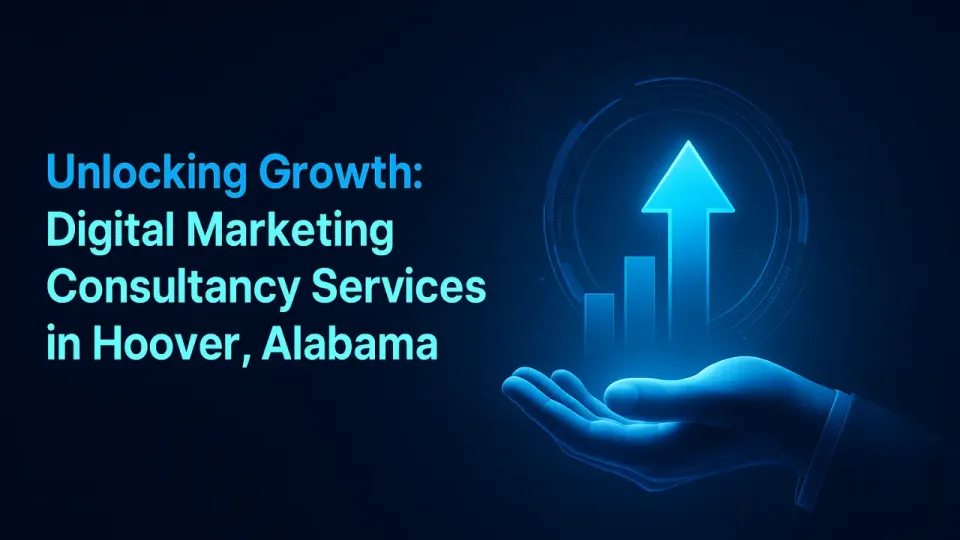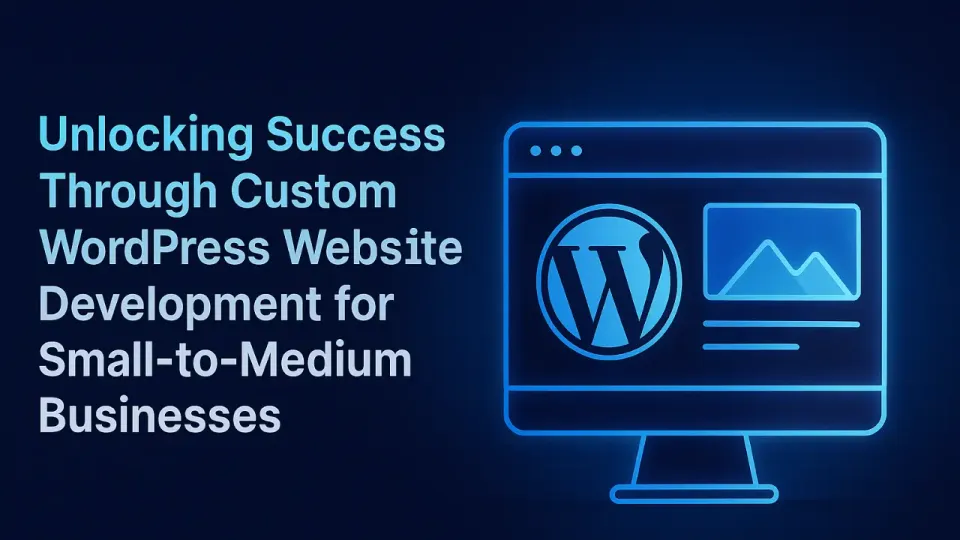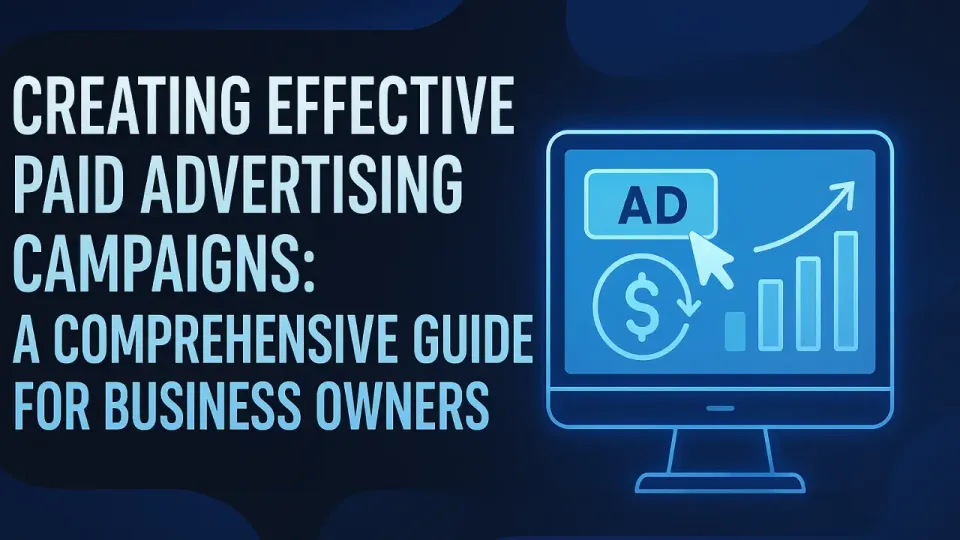WordPress vs. Wix: A Detailed Comparison for Small Business Owners
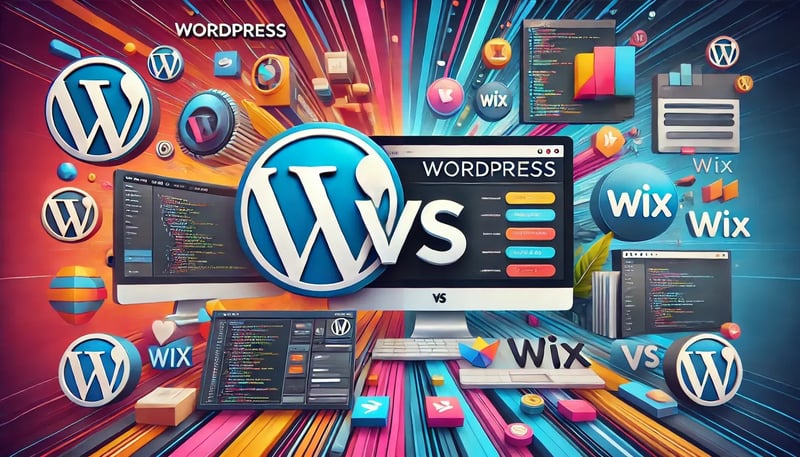
When it comes to building a website for your business, choosing the right platform can make all the difference. With so many options available, it’s easy to feel overwhelmed. Two of the most popular website builders, WordPress and Wix, each offer unique features that cater to different needs. WordPress is known for its flexibility and control, while Wix stands out for its simplicity and ease of use.
But which one is right for you? In this article, we’ll break down the key differences between WordPress and Wix, helping you determine which platform is best suited for your business, whether you’re looking for a fully customizable solution or a quick and easy setup.

Overview of WordPress and Wix
What is WordPress?
WordPress is a powerful and widely used Content Management System (CMS) that gives you complete control over your website’s design, functionality, and content. It comes in two versions: WordPress.org, a self-hosted platform where you manage everything from hosting to plugins, and WordPress.com, which offers a more streamlined experience with hosting included. WordPress.org is by far the more popular choice, powering over 40% of websites on the internet.
What makes WordPress stand out is its flexibility. With thousands of themes and plugins available, you can create anything from a simple blog to a robust e-commerce store. However, this flexibility comes with a learning curve—while anyone can use WordPress, those with technical knowledge tend to get the most out of it.
What is Wix?
Wix, on the other hand, is a user-friendly website builder designed for simplicity. With its intuitive drag-and-drop editor, you can design a professional-looking website without touching a single line of code. Everything you need, from hosting to design tools, is included right out of the box, making it a great option for those who want to get online quickly.
Unlike WordPress, Wix is fully hosted, meaning you won’t need to worry about finding a separate hosting provider or managing technical details. While it may not offer the same level of customization as WordPress, Wix excels in ease of use, especially for beginners or small business owners who want to create a visually appealing website without any hassle.
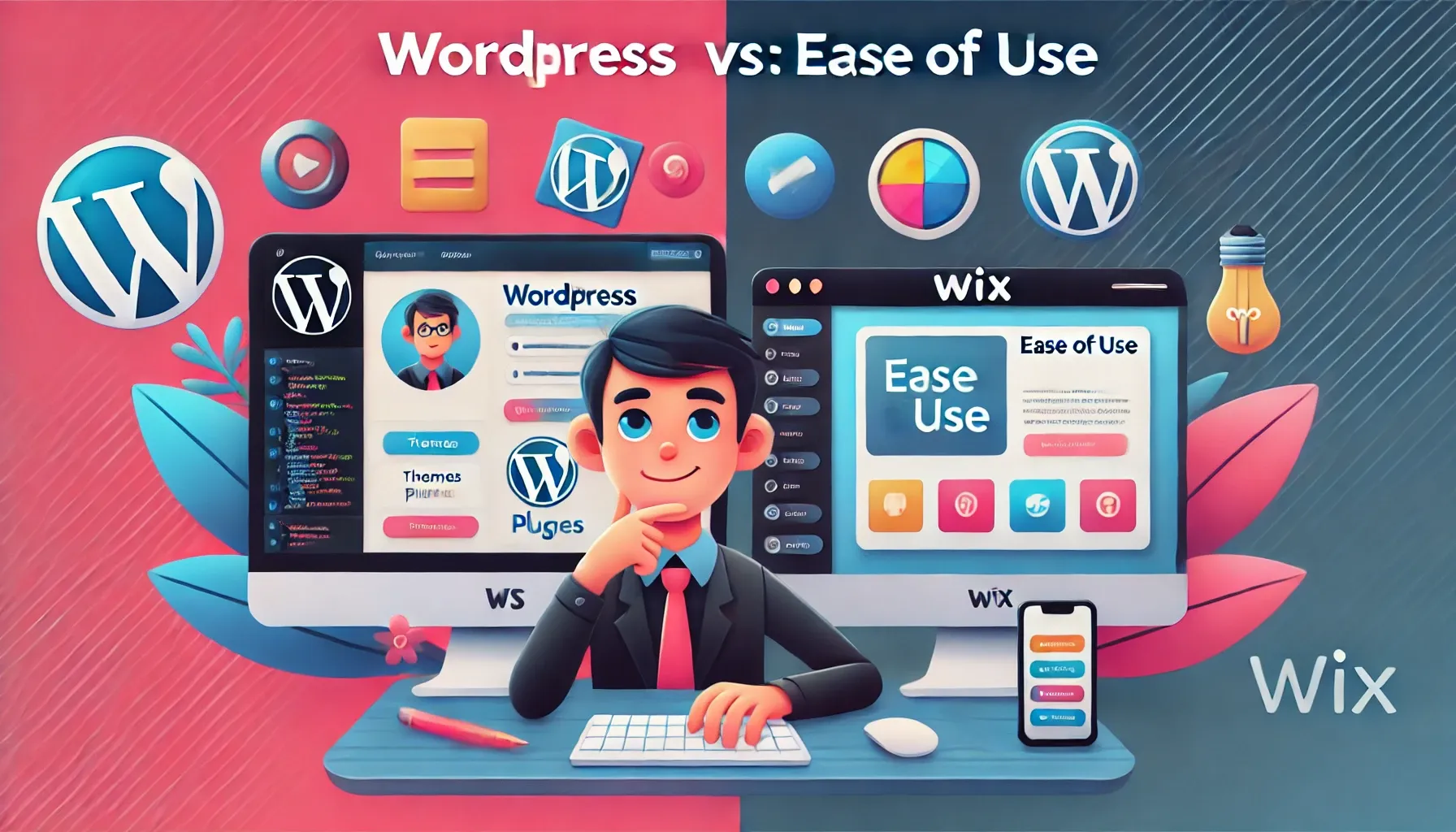
Ease of Use
WordPress
- Setup & Maintenance:
- Requires you to handle hosting, domain registration, and installation of themes/plugins.
- Involves more technical setup and ongoing management.
- Learning Curve:
- Steeper learning curve, especially for beginners.
- Ideal for users with some technical skills or those willing to invest time in learning.
- Customization:
- Offers high levels of customization through themes, plugins, and coding.
- Great for users who want full control over their website’s design and functionality.
- Flexibility:
- Extremely versatile, allowing you to build anything from blogs to complex e-commerce stores.
- But more responsibility for updates, backups, and security.
Wix
- Setup & Maintenance:
- All-in-one platform with hosting, design tools, and domain management included.
- No need to manage technical aspects—everything is built into Wix.
- Learning Curve:
- Minimal learning curve with a simple drag-and-drop interface.
- Perfect for beginners with no technical skills.
- Customization:
- Limited compared to WordPress—primarily relies on pre-designed templates.
- Good for users who want a professional-looking website quickly and easily.
- Flexibility:
- Best for simple to moderately complex websites (e.g., portfolios, small business sites).
- Limited when it comes to scaling up or adding advanced features later.
Wix vs WordPress
Customization and Design
When it comes to customization and design, both WordPress and Wix offer powerful tools, but they differ significantly in how much control and flexibility they provide.
WordPress
WordPress is renowned for its almost limitless customization options. With thousands of themes and plugins available, you can tweak nearly every aspect of your website, from layout to functionality. However, this level of control often requires some knowledge of coding, or at least a willingness to dive into the more technical aspects of website building.
- Themes:
- Access to thousands of free and premium themes.
- Fully customizable, especially for those familiar with CSS and HTML.
- Many themes are mobile-responsive, but you can further customize the design for mobile if needed.
- Plugins:
- Over 60,000 plugins available for everything from SEO optimization to e-commerce.
- Offers flexibility to add advanced features such as memberships, forums, and complex e-commerce functionality.
- Some plugins may require technical knowledge to configure properly.
- Design Flexibility:
- Full control over the layout, appearance, and overall design.
- However, it can be overwhelming for beginners without technical experience.
- Ideal for those who want complete freedom to create a unique, tailored website.
Wix
Wix is designed to simplify the web design process with its user-friendly interface, making it perfect for users who prefer a straightforward, hands-off approach to customization. While it offers less flexibility than WordPress, it allows you to quickly create a visually appealing website using its drag-and-drop builder.
- Templates:
- Offers hundreds of pre-designed templates tailored to different industries.
- Fully customizable through the drag-and-drop editor, though customization options are more limited compared to WordPress.
- All templates are mobile-optimized, and you can make small adjustments for mobile display.
- App Market:
- Includes a range of apps that add functionality (e.g., forms, social media integration, booking systems).
- Not as extensive or flexible as WordPress plugins, but enough for users with basic website needs.
- Design Flexibility:
- Quick and easy design process for building simple, beautiful websites.
- Less control over the finer details of layout and functionality, especially for users looking to create highly customized sites.
- Ideal for users who want an attractive website up and running quickly, without the need to code.
Pricing
Pricing plays a key role in choosing between WordPress and Wix, as both platforms operate under different pricing models. While WordPress offers flexibility in terms of how much you spend, Wix provides a simpler, tiered pricing structure.
WordPress
With WordPress, the costs are more customizable, but they can add up depending on your needs. Since WordPress.org is a self-hosted platform, you have to factor in the cost of hosting, domains, and any premium themes or plugins you decide to use.
- Hosting:
- Prices vary, but hosting typically starts at around $3 to $10 per month for basic shared hosting.
- More advanced hosting (like VPS or dedicated servers) can increase costs significantly, depending on your site’s size and traffic.
- Domain Name:
- Domain names usually cost around $10 to $15 per year, depending on the registrar.
- Themes and Plugins:
- Free themes and plugins are available, but premium themes can range from $30 to $100+.
- Premium plugins can also add costs for features like SEO, security, or advanced e-commerce.
- Total Cost:
- Can be as low as $50 per year for a simple website, but costs can escalate to hundreds or thousands annually if you opt for premium tools and hosting services.
Wix
Wix offers an all-inclusive pricing model, making it easier for users to predict costs. It includes hosting, domain, and basic website-building tools in its plans, with premium features available at higher tiers.
- Free Plan:
- Wix does offer a free plan, but it comes with Wix ads and limited features (no custom domain).
- Premium Plans:
- Prices start around $16/month for basic personal websites.
- Business and e-commerce plans range from $27 to $59/month, offering more advanced features like online store tools and payment gateways.
- Domain Name:
- Free for the first year with most premium plans; after that, expect to pay around $10 to $15 annually.
- Additional Costs:
- Some apps or third-party integrations may require additional fees, but most basic features are covered under the premium plans.
- Total Cost:
- Wix’s all-in-one pricing is straightforward, with a clear monthly fee based on the plan you choose.
- For a business site, expect to pay around $192 to $708 per year, depending on the plan.
E-Commerce Capabilities
If you're building an online store, both WordPress and Wix offer e-commerce solutions, but they cater to different levels of business needs. WordPress is a better choice for more advanced, scalable online stores, while Wix is ideal for smaller shops looking for simplicity and ease of use.
WordPress
With WordPress, e-commerce functionality primarily comes through the WooCommerce plugin, which is highly customizable and scalable. It allows you to transform your website into a full-fledged online store with all the tools necessary to manage products, payments, and shipping.
- WooCommerce Plugin:
- Free to install, but extensions and premium features can add costs.
- Supports unlimited products, categories, and variations.
- Extensive customization for product pages, checkout, and payment methods.
- Payment Gateways:
- WooCommerce supports various payment gateways, including PayPal, Stripe, and direct bank transfers.
- Allows integration with advanced tools for tax management, invoicing, and customer relationship management (CRM).
- Flexibility & Scalability:
- Suitable for both small businesses and large e-commerce stores.
- You can add complex features like subscriptions, memberships, or dynamic pricing with extensions.
- More technical management required, including security, backups, and updates.
Wix
Wix offers built-in e-commerce tools that are easier to set up and use, making it a great option for small businesses or individuals looking to sell a few products online. While not as flexible as WordPress, Wix’s e-commerce features are perfect for those who want a user-friendly experience.
- Wix E-commerce Plans:
- Includes secure payment processing, product management, and shipping tools.
- Premium plans offer features like abandoned cart recovery, multiple payment options, and automated sales tax.
- Simple Product Management:
- Allows you to manage a catalog of physical or digital products.
- Easy to track orders, manage inventory, and configure shipping and tax settings.
- Payment Gateways:
- Supports popular payment methods like credit cards and PayPal.
- Fewer advanced payment integrations compared to WooCommerce.
- Ease of Use:
- Great for beginners or small businesses needing basic e-commerce functionality.
- Less suitable for larger or more complex stores that require advanced features or customization.
SEO Capabilities
Search Engine Optimization (SEO) is crucial for any website that aims to rank higher in search engines like Google. Both WordPress and Wix offer tools to improve SEO, but WordPress provides more flexibility and control, whereas Wix simplifies the process for beginners.
WordPress
WordPress shines when it comes to SEO capabilities, largely thanks to its wide range of plugins that provide robust, customizable SEO tools.
- SEO Plugins:
- Yoast SEO and All in One SEO are popular plugins that offer detailed SEO management, including meta tags, keyword optimization, and readability analysis.
- With the right plugins, you can manage technical SEO aspects like XML sitemaps, schema markup, and 301 redirects.
- Custom Control:
- Full control over permalinks, alt text for images, and other important SEO elements.
- WordPress allows deep customization of HTML tags, meta descriptions, and even page speed optimization, which can improve SEO rankings.
- Content Optimization:
- WordPress’s flexibility allows for better content formatting, helping to create SEO-friendly content.
- Excellent for content-heavy sites like blogs, news portals, or websites focusing on content marketing.
- Advanced SEO Capabilities:
- Perfect for businesses and websites that require sophisticated SEO strategies.
- However, managing these aspects requires some SEO knowledge or using professional services.
Wix
Wix makes SEO easy for beginners by incorporating built-in SEO tools, but its offerings are more limited compared to WordPress.
- Wix SEO Wiz:
- Wix’s SEO Wiz guides users through a simple step-by-step process to optimize their site for search engines.
- Automatically creates sitemaps and lets you easily modify meta tags, titles, and descriptions.
- Basic SEO Features:
- Basic SEO tools include customizable URLs, alt text for images, and mobile optimization.
- Wix automatically generates clean HTML, making it easier for search engines to crawl your site.
- Ease of Use:
- No need to install additional plugins or have technical SEO knowledge—everything is accessible through the platform.
- Limitations:
- Although easy to use, Wix lacks some of the advanced SEO features that WordPress offers.
- Limited control over more technical SEO aspects such as schema markup and advanced metadata.
Support and Community
When choosing a website platform, reliable support and an active community can significantly enhance your experience, especially if you encounter issues or have questions. Both WordPress and Wix offer different levels of support and resources.
WordPress
WordPress has a vast global community and extensive support options, given its popularity and open-source nature.
- Community Support:
- Millions of users worldwide contribute to forums, blogs, and online communities.
- Numerous resources, including tutorials, forums, and blogs, provide solutions to common problems.
- Official Support:
- Official support is limited to documentation and community forums; there’s no direct support from WordPress itself.
- However, many hosting providers offer WordPress-specific support, which can be invaluable for troubleshooting.
- Premium Support Options:
- Some premium themes and plugins provide dedicated customer support, which can be a great resource.
- Many hosting companies offer managed WordPress hosting, including support services.
- Documentation:
- Extensive documentation is available on WordPress.org covering everything from installation to advanced customization.
- Tutorials and guides are readily available, but some may require familiarity with technical concepts.
Wix
Wix provides a more streamlined support experience, focusing on user-friendliness and accessibility.
- Dedicated Support:
- Offers direct support via email, chat, and phone for premium users, making it easier to get help when you need it.
- User-friendly help center with articles, FAQs, and video tutorials covering various topics.
- Community Forums:
- Wix has an active user community and forums where users can ask questions and share tips.
- However, the community is not as extensive as WordPress, given Wix's more closed ecosystem.
- Learning Resources:
- Extensive library of resources, including webinars and articles, to help users get the most out of their platform.
- In-app tutorials and guides provide assistance during the website-building process.
- Accessibility:
- Easier for beginners to access support, as everything is centralized within the platform.
- Less reliance on external resources compared to WordPress.
Conclusion
Choosing between WordPress and Wix ultimately depends on your specific needs, technical skills, and long-term goals for your website. Both platforms have unique strengths that cater to different types of users.
WordPress: A Flexible Powerhouse
- Best For: Users seeking extensive customization and scalability.
- Strengths:
- Robust SEO capabilities and a plethora of plugins.
- Ideal for complex websites, including blogs, portfolios, and e-commerce stores.
- A strong community with vast resources for troubleshooting and support.
- Considerations:
- Requires a steeper learning curve and some technical knowledge.
- Ongoing management of hosting, updates, and security.
Wix: User-Friendly Simplicity
- Best For: Beginners or small business owners wanting a quick, hassle-free setup.
- Strengths:
- Intuitive drag-and-drop interface with easy design tools.
- All-in-one platform with built-in hosting and customer support.
- Quick to set up and maintain, perfect for users with limited time or technical skills.
- Considerations:
- Limited customization compared to WordPress.
- Less suitable for larger, more complex sites that require advanced features.
If you value flexibility and plan to build a complex site, WordPress is likely your best bet. However, if you prefer a straightforward approach and want to get your site up and running quickly, Wix is an excellent choice. Whichever platform you choose, understanding your needs and long-term goals will help ensure your website is a success.
Summary
In the ever-evolving landscape of website creation, choosing the right platform can significantly impact your online success. Both WordPress and Wix offer compelling options tailored to different user needs. WordPress provides extensive customization through themes and plugins, making it ideal for users willing to invest time in learning and seeking advanced search engine optimization (SEO) tools. Though direct support may be limited, it is highly scalable for e-commerce with the WooCommerce plugin. On the other hand, Wix is extremely user-friendly and perfect for beginners or those needing a simple solution, with accessible support and resources. While it offers basic SEO tools and simplified e-commerce features suitable for small to moderate online stores, it lacks the flexibility of WordPress. Ultimately, your choice should align with your goals, technical abilities, and the complexity of the website you envision. Whether you lean towards the flexibility of WordPress or the simplicity of Wix, both platforms can help you create a successful online presence.
"Joining this community has been a game-changer for staying updated on the latest trends & events!" - John B.


